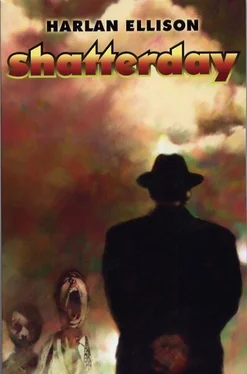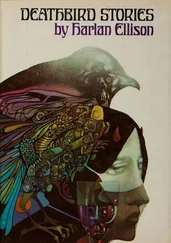He didn’t say she had nice cheekbones or a trim figure. But he didn’t think she was plain.
The Battle of the Ardennes was swirling away now.
She suggested they make love.
Ian Ross got to his feet quickly and walked away.
She watched him for a while, keeping him in sight. Then she got up, dusted off her hands though there was nothing on them, an act of memory, and followed him. Quite a long time later, after trailing him but not trying to catch up to him, she ran to match his pace and finally, gasping for breath, reached him. “I’m sorry,” she said.
“Nothing to be sorry about.”
“I offended you.”
“No, you didn’t. I just felt like walking.”
“Stop it, Ian. I did, I offended you.”
He stopped and spun on her. “Do you think I’m a virgin? I’m not a virgin.”
His vehemence pulled her back from the edge of boldness. “No, of course you’re not. I never thought such a thing.” Then she said, “Well… I am.”
“Sorry,” he said, because he didn’t know the right thing to say, if there was a right thing.
“Not your fault,” she said. Which was the right thing to say.
From nothing to nothing. Thirty-four years old, the properly desperate age for unmarried, unmotherhooded, unloved. Catherine Molnar, Janesville, Wisconsin. Straightening the trinkets in her jewelry box, ironing her clothes, removing and refolding the sweaters in her drawers, hanging the slacks with the slacks, skirts with the skirts, blouses with the blouses, coats with the coats, all in order in the closet, reading every word in Time and Reader’s Digest, learning seven new words every day, never using seven new words every day, mopping the floors in the three-room apartment, putting aside one full evening to pay the bills and spelling out Wisconsin completely, never the WI abbreviation on the return envelopes, listening to talk radio, calling for the correct time to set the clocks, spooning out the droppings from the kitty box, repasting photos in the album of scenes with round-faced people, pinching back the buds on the coleus, calling Aunt Beatrice every Tuesday at seven o’clock, talking brightly to the waitress in the orange and blue uniform at the chicken pie shoppe, repainting fingernails carefully so the moon on each nail is showing, heating morning water for herself alone for the cup of herbal tea, setting the table with a cloth napkin and a placemat, doing dishes, going to the office and straightening the bills of lading precisely. Thirty-four. From nothing to nothing.
They lay side-by-side but they were not tired. There was more to it than that.
“I hate men who can’t think past the pillow,” she said, touching his hair.
“What’s that?”
“Oh, it’s just something I practiced, to say after the first time I slept with a man. I always felt there should be something original to say, instead of all the things I read in novels.”
“I think it’s a very clever phrase.” Even now, he found it hard to touch her. He lay with hands at his sides.
She changed the subject. “I was never able to get very far playing the piano. I have absolutely no give between the thumb and first finger. And that’s essential, you know. You have to have a long reach, a good spread I think they call it, to play Chopin. A tenth: that’s two notes over an octave. A full octave, a perfect octave, those are just technical terms. Octave is good enough. I don’t have that. “.
“I like piano playing,” he said, realizing how silly and dull he must sound, and frightened (very suddenly) that she would find him so, that she would leave him. Then he remembered where they were and he smiled. Where could she go? Where could he go?
“I always hated the fellows at parties who could play the piano… all the girls clustered around those people. Except these days it’s not so much piano, not too many people have pianos in their homes any more. The kids grow up and go away and nobody takes lessons and the kids don’t buy pianos. They get those electric guitars.”
“Acoustical guitars.”
“Yes, those. I don’t think it would be much better for fellows like me who don’t play, even if it’s acoustical guitars.”
They got up and walked again.
Once they discussed how they had wasted their lives, how they had sat there with hands folded as time filled space around them, swept through, was drained off, and their own “chronons” (he had told her about the lunatic; she said it sounded like Benjamin Franklin; he said the man hadn’t looked like Benjamin Franklin, but maybe, it might have been) had been leached of all potency.
Once they discussed the guillotine executions in the Paris of the Revolution, because it was keeping pace with them. Once they chased the Devonian and almost caught it. Once they were privileged to enjoy themselves in the center of an Arctic snowstorm that held around them for a measure of measureless time. Once they saw nothing for an eternity but were truly chilled—unlike the Arctic snowstorm that had had no effect on them—by the winds that blew past them. And once he turned to her and said, “I love you, Catherine.”
But when she looked at him with a gentle smile, he noticed for the first time that her eyes seemed to be getting gray and pale.
Then, not too soon after, she said she loved him, too.
But she could see mist through the flesh of his hands when he reached out to touch her face.
They walked with their arms around each other, having found each other. They said many times, and agreed it was so, that they were in love, and being together was the most important thing in that endless world of gray spaces, even if they never found their way back.
And they began to use their time together, setting small goals for each “day” upon awakening. We will walk that far; we will play word games in which you have to begin the name of a female movie star from the last letter of a male movie star’s name that I have to begin off the last letter of a female movie star; we will exchange shirt and blouse and see how it feels for a while; we will sing every camp song we can remember. They began to enjoy their time together. They began to live.
And sometimes his voice faded out and she could see him moving his lips but there was no sound.
And sometimes when the mist cleared she was invisible from the ankles down and her body moved as through thick soup.
And as they used their time, they became alien in that place where wasted time had gone to rest.
And they began to fade. As the world had leached out for Ian Ross in Scotland, and for Catherine Molnar in Wisconsin, they began to vanish from limbo. Matter could neither be created nor destroyed, but it could be disassembled and sent where it was needed for entropic balance.
He saw her pale skin become transparent.
She saw his hands as clear as glass.
And they thought: too Late. It comes too Late.
Invisible motes of their selves were drawn off and were sent away from that gray place. Were sent where needed to maintain balance. One and one and one, separated on the wind and blown to the farthest corners of the tapestry that was time and space. And could never be recalled. And could never be rejoined.
So they touched, there in that vast limbo of wasted time, for the last time, and shadows existed for an instant, and then were gone; he first, leaving her behind for the merest instant of terrible loneliness and loss, and then she, without shadow, pulled apart and scattered, followed. Separation without hope of return.
Great events hushed in mist swirled past. Ptolemy crowned king of Egypt, the Battle of the Teutoburger Forest, Jesus crucified, the founding of Constantinople, the Vandals plundering Rome, the massacre of the Omayyad family, the court of the Fujiwaras in Japan, Jerusalem falling to Saladin… and on and on… great events… empty time… and the timeless population trudged past endlessly… endlessly… unaware that finally, at last, hopelessly and too late… two of their nameless order had found the way out.
Читать дальше












